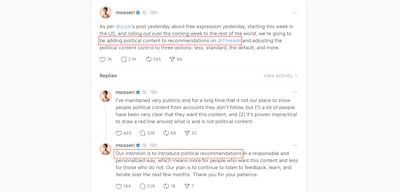Meta chief executive Mark Zuckerberg's announcement that the company plans to phase out fact-checkers largely overshadowed another, in which the social media company said it would soon be increasing the amount of political content on its platforms.
“We're bringing back civic content,” said Mr Zuckerberg in a video posted on Instagram on Monday. “For a while, the community asked to see less politics because it was making people stressed, so we stopped recommending these posts, but it feels like we're in a new era now and we're starting to get feedback that people want to see this content again.”
The previous decision to deprioritise political and civic news on Threads, seen largely as Meta's challenge to X, drew the ire of many users after the platform's debut in 2023.
Instagram and Threads lead Adam Mosseri would frequently engage with users and explain the reasoning, but the policy remained a thorn in the side of many.

“From a platform's perspective, any incremental engagement or revenue they might drive is not worth all the scrutiny, negativity (let's be honest), or the integrity risks that come along with them,” wrote Mr Mosseri in response to a user on Threads in 2023 on the topic.
“There are more than enough amazing communities – sports, music, fashion, beauty, entertainment etc – to make a vibrant platform without needing to get into politics or hard news.”
Yet on Tuesday, Mr Mosseri echoed the sentiments of Mr Zuckerberg regarding political content reappearing in social media feeds.
“We’re going to be adding political content to recommendations on Threads and adjusting the political content control to three options: less, standard, the default, and more,” he posted, somewhat defending his previous stance on the topic.
“I’ve maintained very publicly and for a long time that it's not our place to show people political content from accounts they don’t follow, but a lot of people have been very clear that they want this content, and it’s proven impractical to draw a red line around what is and is not political content,” he explained.

The decision not to “draw a red line” around political content may mark the end of a turbulent series of content-related technical problems for Meta.
After an update to the company's Instagram app in June, users noticed settings had been changed to limit political content on their feeds. The setting was activated to “limit political content from people you don't follow”.
At the time, the setting within the Instagram app defined politics as “likely to mention governments, elections, or social topics that affect a group of people and/or society at large”, so it potentially affected a lot of content for an unknown period of time.
Shortly after users noticed the setting, a Meta representative posted to Threads that the change was an error and the company was working to fix it.

The increase in civic and political content could be a boon to media companies, which had criticised Meta for its decision to deprioritise such content, in turn affecting traffic to news websites. Many articles, it was argued, were inadvertently caught up in the deprioritised algorithm.
Meanwhile, Meta's decision to phase out much of its fact-checking system in favour of a community-notes approach has continued to draw criticism.
It remains to be seen what might happen to the company's independent Oversight Board, which has helped shape Meta policy on various content.
“We look forward to working with Meta in the coming weeks to understand the changes in greater detail,” read a statement posted by the Oversight Board's co-chairwomen and chairmen Evelyn Aswad, Michael McConnell, Pamela San Martin and Helle Thorning-Schmidt.
“As the Oversight Board has repeatedly highlighted, it is essential that decisions on content are taken with maximum input from voices outside of Meta, including of the people who use its platforms every day.”
Groups that monitor hate speech and marginalised groups have expressed concern about Meta's shift from fact-checkers to community notes. Yet some libertarian-leaning and conservative technology groups have welcomed the move.
“These are all solid moves by Meta and the evidence backs it up,” said Taylor Barkley, director of public policy for the Abundance Institute. “During our year of tracking AI-generated election material, it was clear that a community-notes system worked well at moderating content. “As Zuck said, it won't be perfect but adapting new systems to more speech is the right move.”

